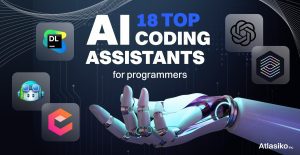The landscape of software development is undergoing a transformative shift, driven by the advent of AI Code Assistants. These intelligent tools are redefining the paradigms of programming, enhancing productivity, and streamlining workflows. As we delve into this new era, it’s essential to understand the capabilities, benefits, and implications of AI Code Assistants in the professional realm.
The Rise of AI Code Assistants

AI Code Assistants are sophisticated software tools designed to aid developers in writing, debugging, and optimizing code. Leveraging advanced machine learning algorithms and natural language processing, these assistants can understand and generate human-like code, making them invaluable assets in the development process. The rise of AI Assistants is a testament to the rapid advancements in artificial intelligence and their application in practical, real-world scenarios.
Enhancing Productivity
One of the most significant advantages of AI Code Assistants is their ability to enhance productivity. By automating repetitive tasks and providing real-time suggestions, these tools allow developers to focus on more complex and creative aspects of coding. For instance, AI Assistants can automatically complete code snippets, suggest improvements, and even identify potential bugs before they become problematic. This not only speeds up the development process but also ensures a higher quality of code.
Streamlining Workflows
In addition to boosting productivity, AI Code Assistants play a crucial role in streamlining workflows. By integrating seamlessly with popular Integrated Development Environments (IDEs) and version control systems, these tools facilitate smoother collaboration among team members. They can track changes, manage dependencies, and ensure that coding standards are consistently adhered to across the board. This level of integration and oversight is particularly beneficial in large-scale projects where coordination and consistency are paramount.
Bridging the Skill Gap
The tech industry often grapples with a significant skill gap, where the demand for proficient developers far exceeds the supply. AI Assistants can help bridge this gap by empowering less experienced programmers with advanced capabilities. These tools provide contextual help, suggest best practices, and offer educational resources, enabling novice developers to learn and grow more efficiently. Consequently, organizations can onboard new talent more effectively and maintain a competitive edge in the market.
Accelerating Innovation

Innovation is the cornerstone of technological advancement, and AI Assistants are catalysts in this process. By reducing the time and effort required for mundane coding tasks, these tools free up developers to experiment and innovate. Whether it’s exploring new programming languages, developing cutting-edge applications, or implementing complex algorithms, AI Code Assistants provide the bandwidth necessary for continuous innovation. This acceleration of innovation not only benefits individual developers but also propels the industry forward as a whole.
Ensuring Code Quality
Maintaining high code quality is a perennial challenge in software development. AI Code Assistants address this challenge by incorporating sophisticated code analysis and review mechanisms. They can detect code smells, enforce coding standards, and provide actionable feedback, ensuring that the codebase remains robust and maintainable. This proactive approach to code quality reduces the likelihood of technical debt and minimizes the risk of costly errors down the line.
Ethical Considerations
While the benefits of AI Code Assistants are manifold, it’s crucial to address the ethical considerations associated with their use. Issues such as data privacy, bias in AI algorithms, and the potential displacement of human jobs must be carefully navigated. Developers and organizations must adopt responsible practices, ensuring that AI tools are used ethically and transparently. This includes safeguarding sensitive data, continuously monitoring AI outputs for biases, and fostering a culture of upskilling and reskilling to mitigate job displacement concerns.
The Future of AI Code Assistants
The future of AI Code Assistants looks promising, with ongoing advancements poised to further enhance their capabilities. As machine learning models become more sophisticated, we can expect these tools to offer even deeper insights and more nuanced suggestions. The integration of AI Assistants with emerging technologies such as quantum computing and blockchain could unlock new possibilities, pushing the boundaries of what’s achievable in software development.
Moreover, the collaborative potential of AI Assistants is likely to expand. Imagine a future where AI tools not only assist individual developers but also facilitate collaboration between human and AI teams, working together to solve complex problems and drive innovation. This symbiotic relationship between humans and AI has the potential to revolutionize the way we approach programming and software development.
Conclusion
AI Code Assistants represent a new age of programming, characterized by enhanced productivity, streamlined workflows, and accelerated innovation. As these tools continue to evolve, they will undoubtedly play an increasingly integral role in the software development ecosystem. By embracing AI Assistants and navigating the associated ethical considerations, developers and organizations can harness their full potential, driving progress and shaping the future of technology.












